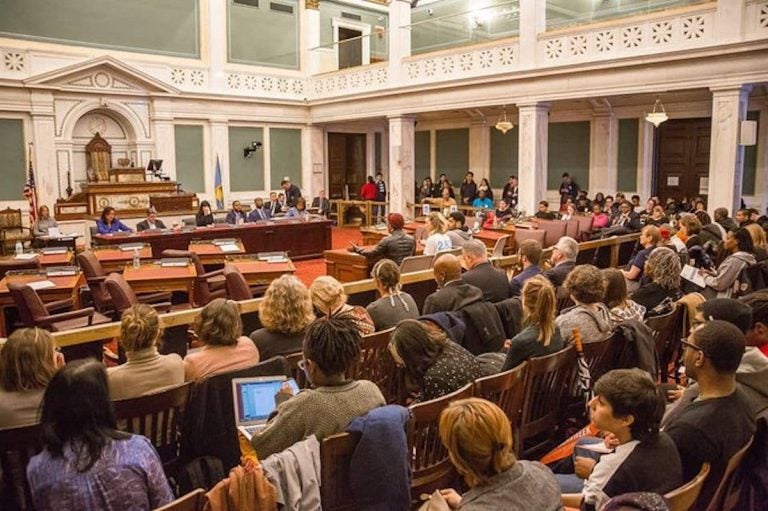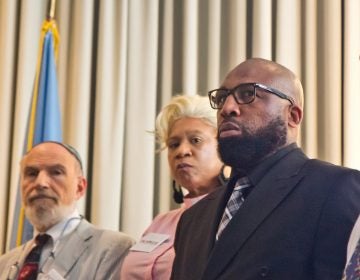Philadelphia police planned to fire 15 officers over Facebook posts, but 11 retired before it could happen
The first public hearing about the social media database this week was nearly eclipsed by all the other Philly police scandals this summer.

(Twitter / @PHLCouncil)
Eleven of the 15 officers the Philadelphia Police Department planned to fire over their offensive Facebook posts retired before they could be disciplined, officials revealed at a City Council hearing Tuesday afternoon.
The first public hearing about the database of officers’ offensive social media posts — which spurred nationwide outrage when it was released in early June — was nearly eclipsed by other scandals that have rocked the PPD in the interim.
At the start of the hearing, acting Police Commissioner Christine Coulter launched into an apology about the “LAPD: We Treat You Like a King” t-shirt she wore in the 1990s. The shirt, a reference to the 1991 police brutality against Rodney King, was unearthed by the Inquirer two weeks ago.
“I’m profoundly sorry that anything I have done could have done such hurt,” Coulter said, later maintaining that, at the time she wore the shirt, she did not “make the inference” between the King beating.
Councilmember Cindy Bass later called on Coulter to resign from her role as acting top cop, to booming applause.
Coulter and Philadelphia Managing Director Brian Abernathy testified that Internal Affairs investigated 343 officers over the database, and 72 were initially suspended from desk duty. Those who have retired will stay off the force for good — i.e. they are not eligible for reinstatement via arbitration like officers who are fired, Coulter said.
Also revealed at the hearing: the Police Advisory Commission, established in the 1990s to help the mayor’s office provide oversight of the PPD, has been kept mostly in the dark about the process.
It has been a tumultuous few months for the PPD, judging by the sheer number of issues brought forth during the three-hour hearing, including:
- the relentless drain of summer gun violence
- the 7.5-hour shooting stand-off shooting in North Philadelphia that left six officers injured
- the subsequent stunning resignation of former Commissioner Richard Ross
- the connected renewed scrutiny on sexual harassment within the department
There were also calls to reform the arbitration process as Mayor Jim Kenney heads into contract negotiations with the PPD, something that happens every few years.
Councilmember Helen Gym also asked Abernathy and the police department to restore the full text of the civilian complaints in the city’s online database, whose redactions were first reported by Billy Penn and WHYY in July.
Most officers retired before PPD could fire them
The database of Facebook posts, published in June 2019 by a group called the Plain View Project, included posts by officers from eight cities. But none had as many cops cited as Philadelphia. Under then-commissioner Ross, the PPD placed 72 officers on desk duty. The city then spent $25,000 on a law firm to vet whether the Facebook posts were protected as free speech.
According to numbers provided by Coulter and Abernathy, officers were found to have violated departmental policy in 193 of the 343 cases investigated by the department’s Internal Affairs Division. Discipline varied for those officers from trainings to suspensions to the 15 recommended terminations. Meanwhile, 24 investigations remain ongoing.
Coulter said investigators were baffled as to why some posts were included in the database. Sometimes, it appeared to be because of the comments — rather than the post itself.
“Because someone commented on their post, they fell into that category,” Coulter said.
The Plain View Project confirmed to Billy Penn that one person was initially misidentified as a Philadelphia police officer and has since been removed from the database.
Coulter noted that under the city’s civil service code, the resignations of the 11 officers meant they could not be reinstated through the arbitration process. For the others who the department intends to dismiss, reinstatement remains a possibility under the city’s current contract.
Abernathy and Coulter reiterated several new changes en route. The department will update its social media policy, Abernathy said, and there is new anti-bias training being rolled out within the department.
Materials for the anti-bias trainings will come to the PPD via the Los Angeles Police Department, Coulter said, drawing both groans and laughter.
So who investigates the PPD’s investigation?
The Police Advisory Commission was established in the 1990s to help provide accountability to the police department within the mayor’s office. Historically, its powers have been limited.
On Tuesday, director Hans Menos testified before Council that his office has been trying to monitor the department’s internal investigation of meme-posting officers for months. The department has shared few details with them, however, he said.
“This was the most information I’ve received to date,” Menos said of Coulter’s testimony.
Menos said the department has severely kneecapped the advisory commission’s watchdog abilities by withholding certain records or mandating that police documents only be reviewed within the Internal Affairs headquarters in Northeast Philadelphia.
Internal Affairs records are deemed, well, internal, meaning that no one has access to the full investigative records outside the department.
Menos argued that the “internal” designation for the Facebook posts investigation is ludicrous, given that the entire database was compiled by civilians searching through publicly accessible Facebook accounts — and also given the resulting impact on public trust in the department.
“We have formally voiced our concerns to the police commissioner,” Menos said.
Councilmembers stressed the need to rebuild community trust — a timeless refrain after each new scandal for the department. Abernathy added the city’s ongoing search for a new police commissioner will include those concerns.
“It’s a start,” Abernathy said. “Building that trust is not going to be an overnight endeavor.”
WHYY is your source for fact-based, in-depth journalism and information. As a nonprofit organization, we rely on financial support from readers like you. Please give today.





